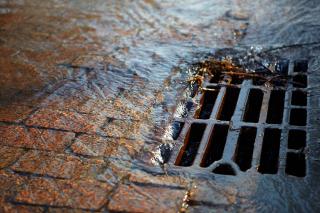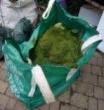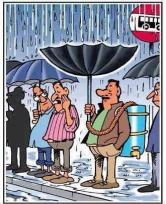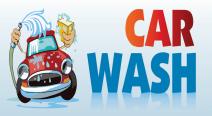Stormwater

Stormwater occurs when precipitation from rain or snowmelt flows over the ground and into the municipal storm sewer system. The flow then enters our local waterbodies without being treated.
To help keep our local waterbodies clear and clean you can do your part by helping the Borough identify illicit discharge or pollution entering the stormwater system. The images below depict everyday items that impact the municipal stormwater system.
 Motor vehicle fluids
Motor vehicle fluids  Household hazardous waste
Household hazardous waste
 Grass clippings and leaf litter
Grass clippings and leaf litter  Animal wastes
Animal wastes
Please notify the Borough if you feel you have seen an illicit discharge.
During a rain event, water runs over the land collecting pollutants and bringing them to the nearest stormwater drain. Pollutants such as fertilizer, pesticide, motor oil, paint and litter that are washed into storm drains flow directly into our waterways including the Wyomissing Creek and Schuylkill River. This pollution degrades our water quality and damages local aquatic habitats.
Everyone can help prevent stormwater pollution by keeping potential pollutants away from storm drains and other bodies of water.
Reducing Stormwater and Flooding
The recent wet weather has made us all aware of what can happen when repeated rainstorms and intense showers occur: runoff – overflowing streams – erosion – property damage – power outages – hazardous traveling conditions – flooding. We can’t turn the rain on and off as we see fit and the damaging storms can never be fully tamed to our desires. We can, however, remain ever aware of the influence we have on the environment when we build, farm and reshape the land and streams to meet society’s wants and needs.
Rainfall happens and with it the inevitable runoff and resulting impacts. What we as a society do to address the influences we have on our environment will have far reaching implications on the health, safety and welfare of future generations as well as on us here and now.
Here are a few suggestions about what you can do to make a difference.
- Disconnect your rain gutters (downspouts) from impervious surfaces (such as driveways and sidewalks) and direct the flow to grassed areas or into infiltration beds (dry wells).
- Install a rain barrel and use the collected rainwater for watering flowers and gardens.
- Allow a buffer of native grasses and other vegetation to grow along streams, ponds, or wetlands. This will filter pollutants, protect the stream channel and bank from erosion, and provide better habitat for aquatic based animals.
- Convert small low-lying areas into rain gardens. These can consist of small gardens of water tolerant plants and bushes that will help retain and infiltrate runoff.
- One of the best ways you can reduce the impacts of stormwater is to reduce the pollutants that can be carried in runoff into streams, reservoirs and water supply intakes. Always properly dispose of household hazardous waste, including cleaning solutions, paints, oils, batteries, solvents, pesticides, sealants, fertilizers, etc. When applying fertilizers or pesticides to your lawn or garden, only apply the recommended amount, and do not apply just before a rainstorm, or near a water body.
Homeowners Guide to Stormwater Maintenance
What you need to know to take care of your property.

Rain Barrels
A Nonpoint Source Pollution Reduction Strategy
What is a nonpoint source pollution (NPS)? NPS pollution occurs when precipitation flows over lawns, parking lots, farm fields, city streets and forests picking up pollutants and carrying them into our streams, rivers and oceans.
Activities such as littering, oil leaks, lawn over-fertilization, and improper disposal of chemicals contribute to the contamination of our local waters. If left unchecked, these activities eventually increase the level of pollution content in our streams and waterways.
What can we each do? Strategies for managing stormwater and reducing nonpoint source pollution can be accomplished in many ways such as installation of pervious surfaces, water quality units, rain gardens or bio retention areas, and subsurface infiltration systems.
A rain barrel is a rainwater collection system that stores rooftop runoff that can be used for irrigating gardens and lawns, while conserving water.
Cisterns, rain barrels, vertical storage, and similar devices have been used for centuries to capture stormwater from the roofs of buildings. Capture and reuse encompasses a wide variety of water storage techniques designed to “capture” precipitation, hold it for a period of time, and reuse the water. Storage/reuse techniques range from small, residential systems such as rain barrels that are maintained by the homeowner to supplement garden needs, to large, “vertical storage” units that can provide firefighting needs. Storage/reuse techniques can be useful in urban areas where there is little physical space to manage stormwater. some models even include planter boxes or flat backs for conserving space.

Benefits of Rain Barrels
- Reduces roof runoff
- Conserves water use
- Reduces pollutants from entering streams
Clean water for gardens, lawns, washing cars, etc.
- Keep openings covered with a fine-mesh screen to prevent mosquito breeding; you can also use “dunks,” a non-toxic bacteria to kill larvae
- Empty barrel frequently to keep stored water from developing odors. Baking soda (not vinegar) can also help.
- Check barrel and connections frequently to remove debris
- Drain barrel and connections and place in storage during winter to avoid freezing damage
- Residence
- Business
- School
- Anywhere there is a rain leader from a roof!
Take Note: Water from barrel should NEVER be used for drinking, cooking or bathing!
How to Wash your Car Without Harming your Local Waterways

Everyone enjoys a clean car. But did you know that by cleaning your car and letting the wash water runoff into the storm drain, you are allowing pollution to enter the local waterways?
Water from washing cars contains dirt and soap, but also oil, grease, and metals such as copper, nickel and zinc. These materials can be toxic to fish, birds and other wildlife that live in local waterways.
The water entering the stormwater network flows straight to local waterways without any treatment. By applying the following recommendations, you will be doing your part in keeping the local waterways cleaner.
If washing your car at home:
- Wash your car on a lawn so that water will not run into a street or storm drain.
- Use rags to wipe brake dust off of wheels before washing.
- Use a nozzle on your hose to conserve water.
- Do not use soap and other chemicals (such as spray-on wheel cleaners). Even biodegradable soap can be toxic to wildlife.
- Pour your bucket of wash water down a sink or toilet or onto landscaping when you are finished.
Car Wash Fundraisers:
- Wash cars on a field instead of a parking lot, so soapy water will not run into storm drains, streets or gutters.
- Contact local commercial car washes for discounted passes that you can sell at a higher price to raise funds.
- Hold the event at a commercial car wash and ask them to donate part of the profits if you help advertise.
- Partner with a self-serve car wash to host the event at their facility and wash cars for tips.
- Hold a neighborhood or park clean up. Take pledges for the amount of trash collected or area cleaned.
Sinkhole Insurance Coverage
Sinkholes occur throughout much of Pennsylvania. These happen when natural running water seeps into the soil and erodes underground limestone or dolomite deposits, forming a cavern. When the roof of the cavern caves in, a sinkhole is formed.
Homeowners who are concerned about sinkholes, or who may live in an area where sinkholes are more common, may want to discuss this coverage with their insurance professional.
Typical homeowners' insurance policies do not cover damage from sinkholes. If you own a home and you want this coverage, you will probably have to request it and purchase it as an additional coverage rider on your homeowners' policy, at an additional cost.

